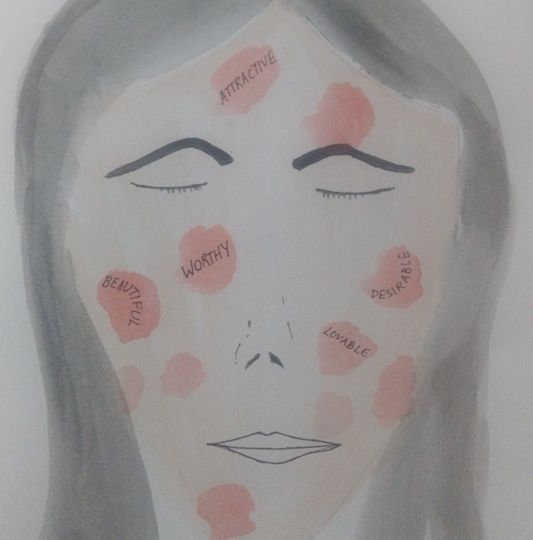
I still vividly remember those days when I feared mirrors. When the mere thought of waking up and looking at my “ugly” face threatened me and carried with it waves of anxiety and embarrassment. The acne on my face, those red, pus-filled boils and the dark scars they left behind, had become more than just another part of me. They defined my identity – “A girl who is not beautiful and hence unworthy of love and attraction”. For a young adult growing up in a world where social messages about beauty, both implicit and explicit, are so strong and constantly present, life can seem daunting. Through those years, I found solace in “other things that I was good at” to be able to maintain some balance and restore some self-esteem and confidence to get past those moments of dread and distress.
I’m not sure if people really judged me because of the acne but I do know that I judged myself. For the longest time (until very recently) I believed that I was “ugly and unworthy of love” and acted in similar ways. This deeply affected my experiences with love, relationships and hindered expressions of my sexuality. I questioned every time I had a desire to be liked and loved. Not because I had any experiences of rejection but because I feared even acting upon my desires because the internalised fear of being disapproved was too hard to ignore. Being conventionally beautiful has been linked to being desirable and worthy of love in media, films and social spaces and conversations. Beauty as defined by clear, white skin, long legs, slim yet curvy body types and you know what I mean, has been portrayed and accepted as a parameter for sexual desires, expression and engagement. Am I saying that people who do not meet these criteria do not experience sexuality to the fullest? No. But the process of experiencing and expressing sexuality is largely influenced by these standards of beauty.
As a girl with acne, I always felt that desiring to be with a person who looked “better” (according to social standards) was only wishful thinking. No one would ever talk about you being checked out, not even in a joke because well, admit it, you’re not worth even that. You would not be an object of desire even in a hypothetical situation between friends because you are not attractive enough. I’m sure none of this is intentionally done to hurt one’s feelings but it goes to demonstrate the entrenched nature of stereotypes and normative ideas that we hold and perpetuate.
If this is not it, there is an entire commune that gave me the pitiful ‘oh, but look at the inner beauty’ advice. There’s nothing wrong with that idea but why is it that you say it only to those who do not fall within the conventional norms? Why is it said in a tone covered in sympathy? It almost only continues to perpetuate the idea that acne makes you look ugly and hence if you desire to be with someone or get attracted to someone, your “inner” qualities are all you’ve got going. It reinforces the belief that since you aren’t “beautiful” you’ve got to be beautiful on the “inside” to be worthy of any attention or attraction.
And if you think beauty standards only come in the way of expression of love, attraction, desire and engagement, that’s not it. Beauty standards also influence self-expression. As a young adult going to college, perceptions about the absence of beauty can strongly influence the way one carries themselves and the efforts taken to groom. I often found myself not taking too much effort, because it didn’t matter anyway. I mean that face was a major put-off already, right?
I’m sure women or men experiencing acne have different narratives, some reflecting this major impact on self-esteem leading to limited social and interpersonal relations and some probably much better and less distressing experiences. However, what remains significant is that acne continues to be normalized as something that everyone experiences or something that is natural and yet continues to be looked down upon as an undesirable attribute.
The last few years have been a struggle in accepting myself with the possibility of always having acne and believing that I am still beautiful, even on the “outside”. This journey of believing that I can be worthy of love, attraction, expression and desire regardless of my looks continues to be liberating and empowering.